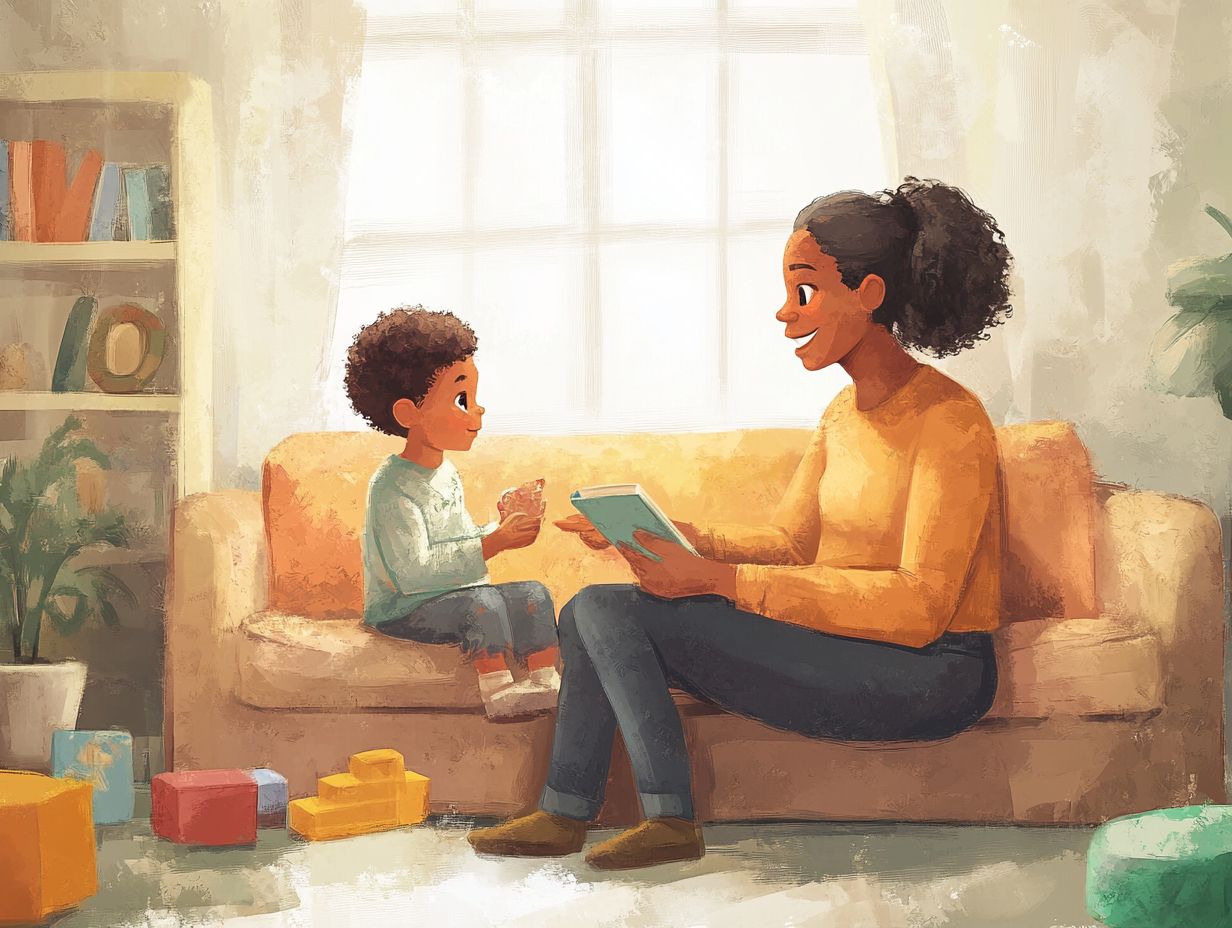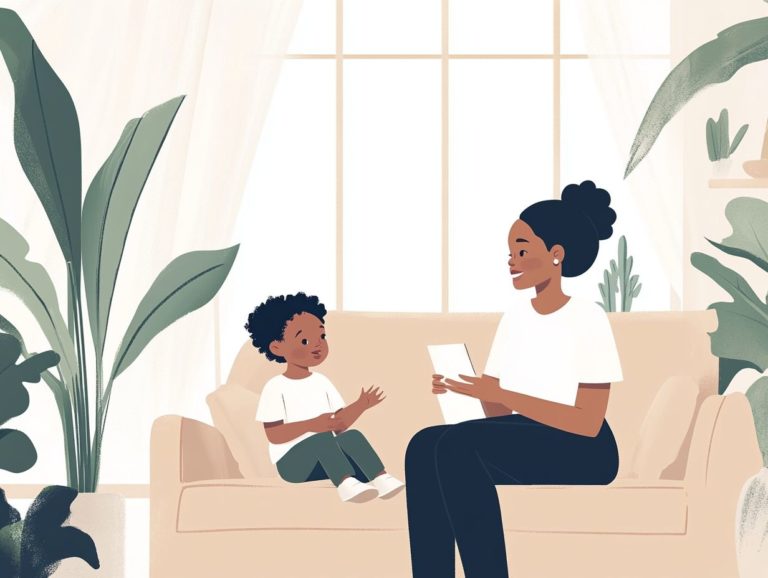10 Questions to Ask Your Child Daily
Contents
- Engaging Daily Conversations with Your Child
- Key Takeaways:
- 1. What Did You Learn Today?
- 2. What Was Your Favorite Part of the Day?
- 3. Did Anything Happen Today That Made You Feel Proud?
- 4. Did You Help Someone Today?
- 5. How Did You Take Care of Yourself Today?
- 6. Did You Try Something New Today?
- 7. Did You Make Any Mistakes Today? How Did You Handle Them?
- 8. What Are You Looking Forward to Tomorrow?
- 9. Did You Show Kindness to Others Today?
- 10. What Are You Grateful for Today?
- Building a Strong Relationship with Your Child Through Thoughtful Questions
- Why Is It Important to Ask Your Child These Questions?
- How Can These Questions Help Your Child Reflect on Their Day?
- What Are the Benefits of Daily Communication with Your Child?
- Frequently Asked Questions
- How can I make these questions more engaging for my child?
- What are some other questions I can ask my kids daily?
- Can I ask these questions at any time of the day, whether we’re in Brooklyn, New York, or elsewhere?
- Are there any other benefits to asking my kids these questions daily?
Engaging Daily Conversations with Your Child
Each day offers your child a distinct tapestry of experiences. As parents, nurturing open communication can truly transform their emotional and social development. Effective parenting advice often emphasizes the importance of these interactions.
This article delves into ten insightful questions you can pose to your child every day to ignite meaningful conversations. By reflecting on their accomplishments and discussing their feelings, these questions not only foster self-awareness but also strengthen the parent-child bond you share. Renowned experts like Michele Borba and resources such as Parenting for Brain offer valuable insights into these practices.
Explore the significance of daily dialogue and the profound effects it has on your child’s growth. Engaging your child through open-ended questions can make a significant difference in their communication skills.
Key Takeaways:

- Encourage daily reflection by asking your child about their day and what they learned. Fun questions can make this process more engaging.
- Nurture positivity by asking about their favorite parts of the day and what they are grateful for. Creative questions can help uncover deeper insights.
- Foster growth and character development by asking about helping others, trying new things, and handling mistakes. These moments are perfect for teaching your child valuable skills!
1. What Did You Learn Today?
When you ask your child, “What did you learn today?” you open a doorway to effective communication that strengthens the bond between you. This simple question helps them think critically and socialize better. The American Academy of Pediatrics (AAP) emphasizes the importance of such daily reflections.
This straightforward yet profound inquiry allows your child to reflect on their learning experiences, helping them articulate their thoughts and feelings more clearly. By engaging in these conversations, you promote critical analysis and problem-solving abilities, which are crucial in today s fast-paced world.
Share your own learning experiences to stimulate this dialogue and create a welcoming two-way conversation. Incorporating storytelling or educational games can also make discussions feel more enjoyable and engaging. These shared learning moments not only enrich your child’s vocabulary but also foster their emotional health, ensuring they feel valued and heard.
2. What Was Your Favorite Part of the Day?
Inquiring about your child’s favorite part of the day does more than just spark a fun conversation it opens a window into their imagination and curiosity, paving the way for richer dialogues and deeper connections. Get to know your child’s interests by exploring what excites them the most during their day.
By simply asking this question, you have the opportunity to uncover valuable insights into their daily experiences and emotional landscape, making it an essential tool for connection. For example, if your child lights up about recess being the best part of their day, you can ask questions such as “What games did you play?” or “Did you make any new friends?” These inquiries not only invite them to share more but also help you understand what environments bring them joy and comfort. Engaging your child with conversation starters helps make these moments even more special.
Such exchanges can unveil unique interests and concerns, cultivating an atmosphere where your child feels truly valued and understood.
3. Did Anything Happen Today That Made You Feel Proud?
Asking your child if anything happened today that made them feel proud is a powerful invitation for them to reflect on their accomplishments and emotions. This practice is essential for their emotional well-being and enhances their social skills through active listening and validation.
This simple yet profound question paves the way for deeper conversations about self-esteem and confidence, helping children recognize their worth and appreciate the small victories that shape their larger identity. It can open the door to discussions about overcoming challenges or celebrating personal milestones, cultivating a robust sense of achievement.
For you as a parent, practicing active listening is crucial. This means giving your child your undivided attention, maintaining eye contact, and showing genuine interest in what they have to say. Summarizing their thoughts can reinforce their feelings and foster an open exchange that encourages further exploration of their emotions. Publications like Good Housekeeping and Parents often provide valuable parenting tips on how to implement these practices.
4. Did You Help Someone Today?
Asking your child, “Did you help someone today?” fosters a sense of responsibility and empathy key ingredients for developing strong social skills and emotional well-being. This simple question encourages them to reflect on their actions and sparks their creativity when it comes to problem-solving.
Not only does it prompt introspection, but it also opens the door to deeper discussions about kindness and the importance of lending a hand to those in need. You can cultivate this mindset by offering your child opportunities to engage in acts of kindness, whether that s volunteering at a local shelter or assisting a neighbor with chores.
Encouraging them to brainstorm unique ways to help others can lead to wonderful ideas, like crafting handmade cards for nursing home residents or organizing a community litter clean-up. By guiding your child to think outside the box when it comes to helping others, they ll discover that acts of kindness can come in many shapes and sizes, all equally meaningful, whether grand or simple.
5. How Did You Take Care of Yourself Today?

Inquiring about what your child did to take care of themselves today is a powerful way to promote their healthy development and emotional well-being. It helps them think about self-care and creates a space where they can share their feelings openly.
This practice is especially important for you as a parent. It guides your child to grasp the significance of self-care at various stages of their growth. For toddlers, engaging in simple activities like brushing their teeth or playing with their favorite toys lays the groundwork for essential self-care habits.
As your child enters preschool, imaginative play and art projects become vital avenues for nurturing creativity and emotional expression. When they reach kindergarten, they learn to identify their feelings and communicate their needs more assertively. This paves the way for older children who will thrive on self-care routines that align with their growing independence such as setting aside quiet reading time or participating in family discussions about emotions.
By modeling these behaviors yourself, you create your own self-care rituals and actively listen to your child’s concerns. This reinforces the notion that taking care of oneself is a vital life skill that begins at a young age. It s crucial to establish these habits early!
In conclusion, asking your child about their daily experiences fosters important conversations that contribute to their emotional intelligence and personal growth. These reflective questions can help children recognize their achievements and understand the value of self-care and kindness, shaping them into empathetic and confident individuals.
6. Did You Try Something New Today?
Asking your child if they’ve tried something new today is a wonderful way to spark their imagination and curiosity, encouraging a positive attitude that helps them think critically.
Creative questions can make these conversations more engaging and insightful. When children dive into novel experiences be it exploring a new sport, experimenting with art, or tasting unfamiliar foods they step outside their comfort zone and embrace a little uncertainty.
This courageous exploration fosters the ability to bounce back from challenges and teaches them that mistakes are merely stepping stones for learning.
You, as a parent, can play a crucial role by introducing activities such as nature scavenger hunts, home science experiments, or community art classes. By actively engaging in these adventures alongside your child, you not only guide them but also celebrate their efforts, reinforcing the idea that trying new things is not only valuable but also incredibly enjoyable.
7. Did You Make Any Mistakes Today? How Did You Handle Them?
Encouraging your child to talk about any mistakes they made today and how they managed them nurtures critical thinking and resilience key elements of healthy development and emotional wellness. Resources like Working Mother offer excellent parenting advice on handling such conversations.
By establishing a safe environment for these conversations, you enable your child to see errors not as failures but as invaluable stepping stones toward success. You might begin this process by asking open-ended questions, such as what they learned from their experience or how they might tackle a similar situation differently in the future.
Sharing your own mistakes can be incredibly beneficial. By showing how you’ve navigated challenges, you help normalize imperfection and inspire your child to embrace their own flaws. Guiding them to brainstorm potential solutions fosters their problem-solving skills and enhances their emotional intelligence, allowing them to process feelings of disappointment or frustration in a constructive way.
8. What Are You Looking Forward to Tomorrow?
Asking your child what they re looking forward to tomorrow can ignite their anticipation and excitement while nurturing their imagination and curiosity. This simple act can strengthen the special connection you share with your child!
Engaging your child in discussions about their aspirations creates a safe space for them to express their feelings, dreams, and fears about the future. For instance, you might explore upcoming events like birthdays, vacations, or school activities, prompting your little one to share what excites them most about those moments.
Using open-ended questions allows your child to dive into their personal goals, helping them envision positive outcomes while honing valuable problem-solving skills. This ongoing dialogue not only supports their emotional intelligence but also promotes a growth mindset, instilling the belief that their dreams are not just fantasies, but truly attainable. Publications like Parenting for Brain and Good Housekeeping often emphasize the importance of such conversations.
9. Did You Show Kindness to Others Today?
Teaching Empathy Through Kindness
Asking about acts of kindness is a proactive way to teach children about empathy from a young age. Whether they are toddlers in preschool or kindergarteners, the principle of kindness remains crucial.
Inquiring if your child showed kindness to others today serves as a powerful way to reinforce the significance of empathy and social skills. It also nurtures emotional well-being through positive communication and active listening. Experts in child psychology, such as those at Working Mother, stress the importance of these daily reflections.
By consistently engaging in these discussions, you create a supportive home where your child actively practices kindness. Encouraging your child to reflect on their interactions fosters a deeper awareness of how their actions impact their peers. This leads to stronger connections and a decrease in feelings of isolation. Imagine using stories about superheroes or dragons to make these ideas exciting for your child!
You can reinforce these concepts by sharing stories that highlight empathy and kindness. Model compassionate behavior yourself or organize family activities centered around community service. Recognizing and celebrating moments when your child displays kindness whether through heartfelt praise or simple acknowledgment can significantly boost their self-esteem and inspire them to continue demonstrating compassion in their daily interactions.
10. What Are You Grateful for Today?

Gratitude is a powerful tool for enhancing emotional intelligence and can be cultivated from a very young age. Whether your child is in preschool or older, this practice is invaluable.
Asking your child what they are grateful for today is a powerful way to nurture their emotional well-being and enhance their communication skills. It encourages them to reflect on the positive aspects of their day and share their feelings. This simple yet profound practice strengthens the bond between you and your child and instills a sense of appreciation and mindfulness that can significantly benefit their overall mental health over time. Engage them with questions about their favorite stuffed animals or holiday memories to make the activity more engaging.
Start engaging in gratitude discussions regularly to transform your child’s outlook today! It enables your child to develop a positive mindset, which can lead to reduced feelings of anxiety and depression. Incorporating gratitude exercises into your daily routine can be effortless; for example, establish a nightly ritual where everyone shares one thing they appreciated that day.
Another effective approach is to create a gratitude jar, where your child can write down things they are thankful for and read them together during family gatherings. These small yet impactful practices help cultivate an environment of positivity and emotional resilience, setting your child up for a brighter future. According to research from the American Academy of Pediatrics (AAP), such practices can have long-lasting benefits.
Building a Strong Relationship with Your Child Through Thoughtful Questions
Why Is It Important to Ask Your Child These Questions?
Asking these questions is not just beneficial; it’s a fundamental aspect of raising kids in today’s world. Publications like Parents and Working Mother underscore the significance of this practice.
Asking your child these questions is essential for building a strong relationship with your child, enhancing emotional well-being, and promoting healthy development. Such inquiries encourage open communication and critical thinking, both of which are crucial for developing vital social skills.
Experts like Erinne Magee highlight that engaging in meaningful dialogue not only nurtures your child’s ability to express their feelings. It also cultivates their analytical thought processes. Michele Borba reinforces this by noting that these interactions provide children with a sense of security, enabling them to build resilience in the face of challenges. Research from Parenting for Brain further underscores these benefits.
Regularly posing thoughtful questions creates an environment where your child feels valued and understood. This ultimately leads to improved emotional intelligence. The bond forged through communication serves as a solid foundation for your child, equipping them to navigate the complexities of social interactions with confidence as they grow.
How Can These Questions Help Strengthen Your Relationship with Your Child?
Strengthening the parent-child bond through reflective questions is a topic covered extensively by experts like Karen Cilli and Michele Borba.
Engaging your child with reflective questions is a powerful way to foster a deeper understanding and enhance communication skills essential for emotional well-being in both of you. Publications like Parents and Good Housekeeping offer numerous tips on incorporating these practices into daily life.
These questions not only help uncover feelings and thoughts but also create a sense of safety and openness in your conversations. For instance, when you ask your child, “What was the best part of your day and why?” you invite them to share their experiences and emotions, paving the way for more meaningful discussions.
When you respond with genuine interest, like saying, “I noticed you seemed really excited when you talked about it; can you tell me more?“, you further highlight your child s perspective, reinforcing the importance of active listening.
By incorporating these reflective questions into your everyday interactions, you cultivate a nurturing environment where both you and your child feel valued and understood. This lays the groundwork for a strong and lasting relationship.
What Are Some Other Questions You Can Ask Your Child?
Asking the right questions can transform everyday conversations into meaningful dialogue, fostering your child’s imagination and curiosity. This is something frequently discussed in publications like Good Housekeeping and Working Mother.
You have an abundance of conversation starters and engaging questions at your fingertips, perfect for keeping your child intrigued and fostering meaningful dialogue. This approach nurtures their imagination and fuels their natural curiosity.
By weaving these inquiries into everyday interactions, you can elevate ordinary moments into opportunities for deeper understanding and connection. Open-ended questions can spark your child’s critical thinking and lead to exciting discussions.
For the little ones, consider a delightful question like, “If you could create a new flavor of ice cream, what would it taste like?” Can you imagine the excitement of creating a new ice cream flavor? You could also ask, “Which superhero would you love to meet and why?” Meanwhile, older kids may find it enriching to reflect on questions such as, “What do you think is the most important quality in a friend?“
Adapting your questions to suit different ages ensures everyone feels included. Toddlers thrive on imaginative scenarios, while pre-teens are ready to dive into more intricate discussions about their dreams and ambitions.
Don t miss the chance to connect with your child through these questions!
How Can These Questions Help Your Child Reflect on Their Day?
Helping your child reflect on their day can start with simple but impactful questions. Experts like Karen Cilli and organizations such as the American Academy of Pediatrics (AAP) support these practices.
These reflective questions invite your child to engage in critical thinking about their day. This not only sharpens their communication skills but also nurtures their emotional well-being as they learn to express their thoughts and feelings.
Magazines like Working Mother and Parents often highlight the importance of these daily reflections.
As they participate in this process, your child will gain a profound understanding of their own emotions while also cultivating empathy for others, a vital aspect of emotional intelligence. You can play an essential role in this journey by guiding your child through reflective practices.
A simple yet powerful technique is to pose open-ended questions at the end of each day, such as, What made you feel happy today? or Was there a moment that frustrated you? These questions create space for meaningful dialogue, enabling your child to delve into their experiences and emotions within a safe environment.
With time, this practice can help your child navigate difficult emotions, build resilience, and enhance their overall social skills.
What Are the Benefits of Daily Communication with Your Child?

Daily communication with your child is a cornerstone of effective parenting, as shown in research from the American Academy of Pediatrics (AAP) and discussions by experts like Erinne Magee.
Engaging in daily communication brings a wealth of benefits, including enhanced emotional well-being, improved social skills, and a stronger parent-child bond that nurtures critical thinking and active listening.
Research from the American Academy of Pediatrics (AAP) underscores that consistent dialogue not only cultivates emotional resilience but also lays a solid foundation for effective problem-solving skills in the future. Experts like Karen Cilli point out that children who frequently engage in open conversations with their parents tend to exhibit higher self-esteem and develop better coping strategies when faced with challenges.
This is particularly important as your child grows and faces more complex challenges in life. Michele Borba emphasizes that clear communication enables children to build empathy and understanding towards others, creating essential skills for their future interactions.
In essence, prioritizing these daily discussions significantly bolsters your child’s overall development, enabling them to navigate personal and social landscapes with unwavering confidence.
Frequently Asked Questions
For more parenting tips, you can refer to articles on Parenting for Brain and follow experts like Erinne Magee and Karen Cilli who offer valuable insights.
What are 10 questions to ask my child daily?
- How was your day today?
- What was the best part of your day?
- Did you learn anything new today?
- How did you show kindness to someone today?
- What are you grateful for today?
- What made you smile today?
- What do you want to achieve tomorrow?
- Did you have any challenges today? How did you overcome them?
- What was your favorite subject in school today?
- Is there anything you want to talk about or share with me?
Why should I ask my child these questions daily?
Asking these questions daily is a practice recommended by experts in child psychology, including Erinne Magee and organizations like the American Academy of Pediatrics (AAP).
Asking your child these questions daily helps to create a strong bond between you and your child. This encourages open communication, helping your child share their thoughts and feelings with you. It can also help you understand your child better and address any issues or concerns they may have.
How can I make these questions more engaging for my child?
You can make these questions more engaging for your child by adding a fun twist to them. For example, instead of asking “How was your day today?” you could ask “If your day was a movie, what would the title be?”
This will make the questions more interesting. Your child, whether they are toddlers, preschoolers, kindergarteners, or older kids, will be more likely to open up and share their thoughts.
What are some other questions I can ask my kids daily?
Some other questions you can ask your child daily include:
- “What did you do to help someone today?”
- “What was the most challenging part of your day?”
- “What are you looking forward to tomorrow?”
- “What did you do for fun today?”
- “What are you proud of yourself for today?”
These questions will spark your child s imagination and encourage them to think about their day! They can also help your child reflect on their actions and feelings and promote positive behavior.
According to experts like Michele Borba and resources like Parenting for Brain, these strategies are crucial for child development.
Can I ask these questions at any time of the day, whether we’re in Brooklyn, New York, or elsewhere?
Yes, you can ask these questions at any time of the day. Many parents often ask these questions during dinner or at bedtime. This allows for quality time with their child and a chance to discuss their day.
However, you can also ask these questions during a car ride, while doing chores, or at any other time that works best for you and your child. Publications like Good Housekeeping and Parents magazine often highlight the importance of finding the right moment to engage kids in meaningful conversations.
Are there any other benefits to asking my kids these questions daily?
Asking your kids these questions daily has other benefits. It not only builds a strong relationship with your child and promotes open communication but also helps them develop problem-solving skills, improve their emotional intelligence, and build self-awareness.
This practice shows your child that their thoughts and feelings matter and that you are genuinely interested in their daily experiences.
Parenting experts like Erinne Magee and Karen Cilli emphasize these benefits, which are also supported by the American Academy of Pediatrics (AAP).






